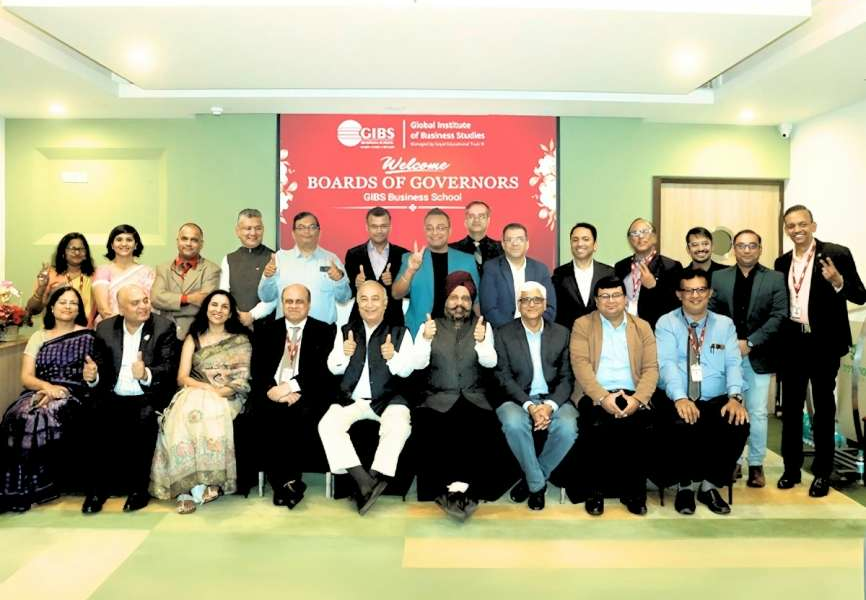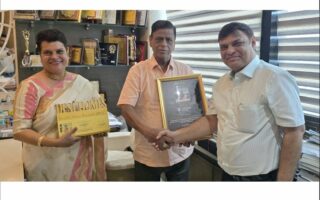Bangalore, August 01, 2024 – The Global Institute of Business Studies (GIBS) Bangalore held its pivotal Annual Board of Governors (BoG) Meeting over two days, on July 19, 2024, and July 20, 2024. This strategic session focused on curriculum overhaul and industry alignment for the academic year 2024-25, featuring 29 esteemed board members whose expertise spans various sectors of industry and academia.
Board of Governors:
- Mr. Ritesh Goyal – Managing Director, Serial Entrepreneur, and an Inspiring Business Leader.
- Dr. Jayanta Chakraborti – Dean & Principal, with a background in Business Analytics & Digital Marketing.
- Mr. Bharath Gopalan – Program Chair, Expert in HR and Training, Author of “BREAK YOUR BOUNDARIES.”
- Mr. Ravi Agarwal – Director – Administrator, known for his visionary leadership and team-building skills.
- Mr. Pradeep Khadria – Director of Admissions, blending Marketing Expertise with Engineering Acumen.
- Mr. Sandeep Bhansali – Head of Admissions, combines Marketing Expertise with Vibrant Personality.
- Ms. M Sowmya – Head of IQAC & Accreditations, with a strong focus on quality assurance and industry interface.
- Mr. Mohanraj T S – Dean of Placements & Corporate Relations, passionate about education and training.
- Mr. Guru Prasad – Head of Strategic Alliances & Executive Education, with extensive experience in banking and academia.
- Mr. Abhiroop Mitra – Professor of Practice – Marketing, integrating industry insights into academia.
- Dr. Anirban Ghatak – Professor and Area Chair- Finance, noted for his extensive teaching and research in finance.
- Dr. A R Vijaya Chandran – Professor and Area Chair- HR and OB, with expertise in law and business.
- Dr. A V R Mahadev – Associate Professor- Marketing, known for his mentorship and networking skills.
- Dr. Pallavi Vyas – Associate Professor- HR and OB, a proponent of case-based teaching.
- Mr. Prashant Tibrewal – Founder of Alum-n-i, World’s Largest International Alumni Platform.
- Mr. Mohan Kumar – Practice Head at Wipro Pvt. Ltd., focused on youth leadership and community projects.
- Mr. Soumyadip – Director & Chief Officer at Aingenious Consulting Pvt Ltd., specializing in digital transformation.
- Prof. Antarpreet Singh – Director Academics, with decades of experience in Digital Learning and Executive Education.
- Dr. Shiv Tripathi – Vice Chancellor, Atmiya University, with extensive international academic experience.
- Dr. Sumit Narula – Director, Amity School of Communication, a prominent researcher and editor in Media Studies.
- Mr. Sofi Zahoor – CEO, Human Cap, with a strong background in HR and IT industries.
- Major (Dr.) Gulshan Sharma (Retd) – Director General, Chamber for Service Industry, with a focus on service industry training.
- Dr. Archana Ainapure – Director, Texas School of Management, an authority in Nutrition and Wellness.
- Mr. Nitin Beri – CEO, Fortune Growth Advisory, with extensive experience in education and sports management.
- Mr. Manoj Kumar Srivastava – Director (Professional Examinations) at CBSE, New Delhi.
- Mr. Chetan Garga – Managing Director, Allstate India, recognized for his leadership in technology and operations.
- Dr. Kirti Udayai – Head Academics, Max Healthcare Institute Limited, specialized in Management and Healthcare Education.
Meeting Overview and Strategic Decisions:
The meeting initiated with Prof. Bharath Gopalan setting the context and Dr. Jayanta Chakraborti delivering the keynote address, focusing on past achievements and the vision for a rigorous and industry-aligned curriculum.
Key Discussions:
- Future Readiness: Dr. Antarpreet Singh emphasized aligning the curriculum with futuristic industry requirements.
- Innovation in Teaching: Dr. Kirti Udayai advocated for making the syllabus more practical and meaningful through continuous innovation.
- Engaging Education: Maj. Dr. Gulshan Sharma discussed integrating education into daily routines, making learning enjoyable and beneficial in real-world applications.
- Industry-Centered Learning: The board agreed on a strategy to integrate industry exposure deeply into the academic activities.
- Skill Development: Suggestions included integrating AI and life skills, and Rtn. Mr. Mohan Kumar’s proposal for developing T-shaped skills among students.
- Entrepreneurial Ventures: Dr. Sofi Zahoor recommended enhancing the finishing school and supporting student-run businesses like a canteen, laundry service, or stationery shop with initial funds from the institution, allowing students to manage them independently to develop entrepreneurial skills.
There were various other suggestions by other BoG members to encourage research within the student community, facilitated and guided by the faculty. Mindfulness and life skills were discussed as very important for the well-being and growth of the students. It was suggested to adopt an industry-centered approach as it is the future of management education. Corporates and industry must be an essential and integral part of all activities of the institute regarding academics, including syllabi formation and other teaching-learning activities like industry-academia interface through guest sessions. Additionally, integrating AI and life skills into each course was emphasized.
The BoG members also recommended that students conduct a self-audit by asking which generic/transferable skills are most important to them, assessing their current competency in those areas, and providing convincing evidence to support their abilities.
Strategic Goals for GIBS Business School
During the Annual Board of Governors Meeting, the strategic goals for GIBS Business School were thoroughly deliberated upon, resulting in a clear path forward for the institution. The discussion revolved around three primary goals and six supporting strategies, with recommendations from the board on curricular aspects.
Goals:
1. Impart Industry-Centered Management Education:
Align the curriculum with current and future industry requirements to ensure students are well-prepared for their professional careers.
2. Identify a Core Area of Excellence:
Specialize in a particular discipline to distinguish GIBS from other institutions and become a leader in that academic field.
3. Enhance the IRE School at GIBS:
Further, develop the Innovative Research and Education (IRE) School to foster cutting-edge research and academic excellence.
Supporting Strategies:
1. Mission and Vision:
Develop a clear mission and vision for the institute to guide all strategic initiatives and decisions.
2. Industry Involvement:
Integrate industry participation in every aspect of the curriculum to ensure teaching practices are meaningful and aligned with industry needs.
3. Technology Integration:
Use appropriate software and technology as part of the teaching pedagogy to prepare students for the tools they will use in their careers.
4. Internships and Employment:
Establish the possibility of three internships and form tie-ups with companies to secure full-time employment for students based on their performance.
5. Co-Learning Approach:
Replace traditional teaching methods with a co-learning approach to foster collaboration and engagement.
6. Soft Skills and Experiential Learning:
Emphasize the importance of soft skills and provide opportunities for experiential learning through various courses and projects.
Additional Recommendations:
1. Finishing School Development:
Continue to enhance the Finishing School concept to polish students’ professional skills and ensure they are job-ready.
2. Extracurricular Courses:
Make education enjoyable by adding courses in music, dance, wellness, and other areas of interest.
3. Entrepreneurial Support:
Encourage entrepreneurial projects by students and provide them with financial support.
4. Continuing Education:
Build continuing education opportunities for alumni, encouraging them to return for upskilling.
5. Citizen Leadership:
Foster citizen leadership within the organization to build a strong, values-driven community.
6. Alumni Engagement:
Create a lifelong association with alumni to maintain strong connections and support networks.
7. Self-Paced Learning:
Enable self-paced learning through technology to accommodate different learning styles and paces.
8. Research Focus:
- Appoint a Dean for Research and Publication and recruit research associates to enhance the institute’s research capabilities.
- Establish a school of interdisciplinary research to promote collaboration across various fields.
9. Digital Media Agency:
Create an in-house digital media agency to manage the institute’s digital presence and communications.
Implementation and Monitoring:
1. Point of Contact:
Designate one individual responsible for status updates on the progress of these strategic goals.
2. Regular Meetings:
Hold virtual or in-campus meetings every three months to discuss developments and ensure continuous improvement.
These strategic goals and recommendations are poised to steer GIBS Business School toward becoming a leader in management education, integrating industry-centric approaches with academic rigor. This meeting marks a significant step toward GIBS’s commitment to excellence and innovation in management education.
Finance Area Chair: Recommendations by Dr. Anirban Ghatak
Dr. Anirban Ghatak, the Finance Area Chair at GIBS, provided recommendations to enhance the finance curriculum, making it more dynamic and globally aligned:
- Curriculum Revision:
- Map the curriculum with global professional bodies to ensure international standards.
- Engaging Course Packs:
- Introduce diverse topics such as Financial Statement Analysis, Alternative Investments, Private Equity, Green Finance, and Financial Inclusion.
- Creative Assessments:
- Implement role plays, mock trading, and news article reviews for practical learning.
- Unique Courses:
- Develop courses using business articles, RBI reports, and symposium-based content like Management of Financial Services (MFS).
- Alumni Involvement:
- Engage alumni in coursework for real-world insights.
- Interactive Activities:
- Create activities like Market Volatility Game, finance simulations, VBA Macros, and Taxation for Managers.
These recommendations aim to make the finance curriculum at GIBS more engaging, practical, and aligned with global standards.
Marketing Area Chair: Recommendations by Dr. AVR Mahadev
Dr. AVR Mahadev, the Marketing Area Chair at GIBS, provided detailed recommendations aimed at enhancing the marketing curriculum to make it more dynamic and industry-relevant:
- Hands-On Experience for Marketing Analytics:
- Introduce practical sessions early in the curriculum to give students a real-time understanding of marketing analytics tools and techniques.
- Incorporate Modern Marketing Techniques:
- Include components of digital marketing and brand sustainability within the existing courses to reflect the evolving marketing landscape.
- Application of Cloud Platforms in CRM:
- Integrate cloud technology into Customer Relationship Management (CRM) courses to provide students with knowledge of cutting-edge technology used in the industry.
- Enhance Selling Skills and Promotional Strategies:
- Introduce advanced selling skills and promotional strategies in the curriculum to better prepare students for the sales and marketing sectors.
- Expand Course Content:
- Update the Brand Management and Integrated Marketing Communications (IMC) courses to include modern concepts like digital branding and advanced advertising techniques.
HR Area Chair: Recommendations by Dr. AR Vijay Chandran
Dr. AR Vijay Chandran, overseeing the HR and OB areas, focused his recommendations on integrating advanced technology and enhancing the human aspect of business management:
- Mental Health and Stress Management:
- Include courses and workshops focused on mental health, using role plays and counseling sessions to teach stress management techniques.
- Advanced Recruitment and Performance Management Technologies:
- Teach modern HR technologies and software, such as 360-degree feedback systems and performance management platforms like Bamboo HR and ZOHO.
- Employee Engagement and Corporate Interaction:
- Facilitate alumni meets and corporate interactions to provide students with networking opportunities and insights into the corporate HR world.
- Integration of AI in Organizational Behavior:
- Implement AI tools in teaching to simulate real-world HR scenarios, helping students understand complex organizational dynamics.
Recommendations by Prof. Bharath Gopalan
Prof. Bharath Gopalan, the Program Chair, presented a visionary approach towards enhancing the overall educational strategy at GIBS:
- Rethink Certification and Accreditation:
- Review and potentially redesign certification processes to align better with industry standards and educational advancements.
- Incorporation of Global and Cultural Elements:
- Add foreign language courses and integrate global business strategies to prepare students for international markets.
- Emphasize Non-Traditional Learning:
- Include courses on Vedic management, yoga, and meditation to promote holistic education and well-being.
- Enhance Practical Learning through Case Studies:
- Increase the use of Indian and international case studies in the curriculum to provide students with insights into real business problems.
Conclusion
The Board of Governors meeting at GIBS, a top business school in Bangalore, set a transformative path for the institution, focusing on integrating industry-centric approaches with academic rigor. These strategic goals and recommendations are poised to equip students with the necessary skills and knowledge, ensuring they thrive in evolving business landscapes. This meeting marks a significant step toward GIBS’s commitment to excellence and innovation in management education.




